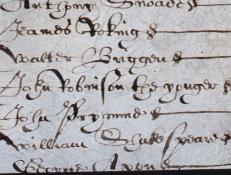To view a sortable list, please visit the Resource
All Documents
ca. 1598
SHAKESPEARE DOCUMENTED IS STILL GROWING! Descriptive content and transcriptions will continue to be added, updated and expanded. Check back for regular updates!
January 24, 1598
In this letter, dated January 24, 1598, Abraham Sturley wrote to fellow Stratford townsman Richard Quiney about several town matters, including a rumor regarding Shakespeare’s intent to purchase land.
November 4, 1598
On October 25, 1598, Richard Quiney wrote both to Shakespeare, asking for his help in securing a loan of £30 and to his friend Abraham Sturley in Stratford-upon-Avon to let him know the request had been made.
February 25, 1598
Henry IV Part 1 was entered into Liber C of the Stationers' Company on February 25, 1598, under the title "The historye of Henry the iiijth with his battaile of Shrewsburye against Henry Hottspurre of the Northe with the conceipted mirthe of Sir John Ffalstoff." Andrew Wise
July 22, 1598
The Merchant of Venice was entered into Liber C of the Stationers' Company on July 22, 1598, under "the title the Marchaunt of Venyce or otherwise called the Jewe of Venyce." James Roberts, the London printer and publisher who entered the title, was allowed to enter the pla
ca. November 4, 1598
While in London in the autumn of 1598, Richard Quiney received five letters from his father Adrian. Four are dated (October 20 and 29, November 10 and 18).
October 1, 1598
Lay subsidies were a type of tax based on personal wealth. In London, the collection of subsidies was managed at the local level of ward and parish.
1598
The borough chamberlain, in his accounts submitted in January 1598, included an entry that at some point in the previous twelve months he paid “Mr Shaxpere” 10 pence for “on lod of ston,” one of a set of five payments made towards the repair of the bridge over t
July 18, 1598
In the summer of 1598, Thomas Blackford of Butlers Marston sold a house on the north side of Sheep Street, Stratford-upon-Avon, to Daniel Smith. The deed recording the sale, shown here, was drawn up on July 18.
February 4, 1598
In this 1598 survey of those storing grain in Stratford-upon-Avon, “W[illia]m Shackesp[ear]e” is listed as holding 10 quarters of malt.















